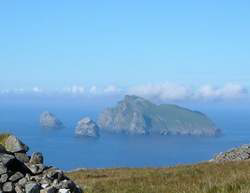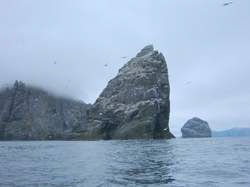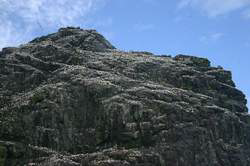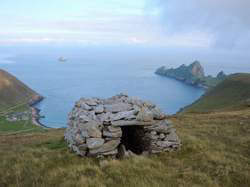Abandoned Communities ..... St Kilda
In theory St Kilda was part of Scotland, and after the union with England and Wales part of Great Britain. However, for most of its history it was effectively overlooked by national governments. The Inland Revenue never attempted to impose taxation, and the inhabitants of St Kilda were never invited to register on an electoral roll. No crime was ever officially recorded. No one from St Kilda was called up into the armed forces. In 1838 Lachlan MacLean wrote "Where is the land which has neither arms, money, care, physic, politics, nor taxes? That land is St Kilda".
Lachlan MacLean, Sketches on the Island of St Kilda, McPhun, 1838.
St Kilda was, however, included in the official census from 1851, and later in the nineteenth century it had to be specifically excluded from legislation designed to protect sea birds.
On the whole the people were left free to develop their own form of society. The outcome was a form of communism in which decisions affecting the whole community were taken in a collective manner, though only by the men, work was assigned on the basis of individual skills, and there was no private property apart from accommodation, furniture, and other items necessary for the maintenance of the traditional way of life. The community made sure that those who were sick, disabled, or elderly could live at the same standard as anyone else.
Mary Harman, op. cit., presents comprehensive information about the houses, furniture, tools and utensils, equipment for heating and lighting, and clothing. In addition she devotes two pages to a list of wooden locks preserved in collections in Scotland and elsewhere and diagrams depicting a chosen half dozen of the locks.
The men of Hirte would meet every morning except on Sunday to share information, discuss current issues, resolve disputes, and make decisions, in particular in relation to work that needed to be done. Decisions were reached by consensus. Photographs of such meetings show the men sitting or standing outside one of the houses. At least half of them are not wearing anything on their feet, and many have not had a shave for a very long time. Several dogs are moving among them.
Visitors to St Kilda often described what they referred to as the "parliament". Observers from elsewhere tended to write about the differences between life on St Kilda and the way of life they themselves were familiar with, but I very much approve of the approach followed by John Ross, who was a school teacher on Hirte during the 1880s. He tended to look for similarities, and in writing about the morning meeting said it "very much resembles our Honourable British Parliament in being able to waste any amount of precious time over a very small matter while on the other hand they can pass a Bill before it is well introduced".
John Ross, Notes on the Island of St Kilda, 1887-8. A poem inspired by a photograph of the parliament can be seen in the Poetry section.
A very large proportion of the communal work involved the catching of sea birds and the gathering of eggs. Gannets, fulmars, puffins, and others existed in large numbers on Hirte, the neighbouring islands, and the rock stacks. Until it became extinct in 1844 the great auk was sometimes caught on St Kilda. After a day capturing fulmars, for example, all the dead birds would be placed on a large pile, and then distributed to each family according to the size of the family. Men who returned with especially large quantities of fulmars would receive the same share as any others.
Observers familiar with the industrial revolution and the rise of capitalism tended to be troubled by this system. Some were inclined to describe the islanders as lazy, noticing that when there were few tasks to be done they were likely to stand around chatting to each other. Another allegation was that the system impeded individual initiative. It was reported, for example, that one man thought it might improve his house if he put down a wooden floor in part of it, but he was soon deterred by the objections of others who argued that they had lived happily with earth floors for many centuries.
It does seem to have been the case that certain types of work were neglected if they were not urgent and not seen as the responsibility of any individual resident. In particular the maintenance of boats often left much to be desired. Boats were valuable to the people of St Kilda, not just because they were essential in providing transport to the neighbouring islands and occasionally further afield, but also because no trees grew on St Kilda and therefore the inhabitants were unable to construct boats for themselves. A specific task that was postponed much too long was to lay a floor in the church, making use of cement transported to Hirte for that purpose and left in bags outside the church. The men failed to start work on the floor and soon afterwards were surprised to see that the "bags of dust" had turned to stone.
Lachlan MacLean, Sketches on the Island of St Kilda, McPhun, 1838.
St Kilda was, however, included in the official census from 1851, and later in the nineteenth century it had to be specifically excluded from legislation designed to protect sea birds.
On the whole the people were left free to develop their own form of society. The outcome was a form of communism in which decisions affecting the whole community were taken in a collective manner, though only by the men, work was assigned on the basis of individual skills, and there was no private property apart from accommodation, furniture, and other items necessary for the maintenance of the traditional way of life. The community made sure that those who were sick, disabled, or elderly could live at the same standard as anyone else.
Mary Harman, op. cit., presents comprehensive information about the houses, furniture, tools and utensils, equipment for heating and lighting, and clothing. In addition she devotes two pages to a list of wooden locks preserved in collections in Scotland and elsewhere and diagrams depicting a chosen half dozen of the locks.
The men of Hirte would meet every morning except on Sunday to share information, discuss current issues, resolve disputes, and make decisions, in particular in relation to work that needed to be done. Decisions were reached by consensus. Photographs of such meetings show the men sitting or standing outside one of the houses. At least half of them are not wearing anything on their feet, and many have not had a shave for a very long time. Several dogs are moving among them.
Visitors to St Kilda often described what they referred to as the "parliament". Observers from elsewhere tended to write about the differences between life on St Kilda and the way of life they themselves were familiar with, but I very much approve of the approach followed by John Ross, who was a school teacher on Hirte during the 1880s. He tended to look for similarities, and in writing about the morning meeting said it "very much resembles our Honourable British Parliament in being able to waste any amount of precious time over a very small matter while on the other hand they can pass a Bill before it is well introduced".
John Ross, Notes on the Island of St Kilda, 1887-
A very large proportion of the communal work involved the catching of sea birds and the gathering of eggs. Gannets, fulmars, puffins, and others existed in large numbers on Hirte, the neighbouring islands, and the rock stacks. Until it became extinct in 1844 the great auk was sometimes caught on St Kilda. After a day capturing fulmars, for example, all the dead birds would be placed on a large pile, and then distributed to each family according to the size of the family. Men who returned with especially large quantities of fulmars would receive the same share as any others.
Observers familiar with the industrial revolution and the rise of capitalism tended to be troubled by this system. Some were inclined to describe the islanders as lazy, noticing that when there were few tasks to be done they were likely to stand around chatting to each other. Another allegation was that the system impeded individual initiative. It was reported, for example, that one man thought it might improve his house if he put down a wooden floor in part of it, but he was soon deterred by the objections of others who argued that they had lived happily with earth floors for many centuries.
It does seem to have been the case that certain types of work were neglected if they were not urgent and not seen as the responsibility of any individual resident. In particular the maintenance of boats often left much to be desired. Boats were valuable to the people of St Kilda, not just because they were essential in providing transport to the neighbouring islands and occasionally further afield, but also because no trees grew on St Kilda and therefore the inhabitants were unable to construct boats for themselves. A specific task that was postponed much too long was to lay a floor in the church, making use of cement transported to Hirte for that purpose and left in bags outside the church. The men failed to start work on the floor and soon afterwards were surprised to see that the "bags of dust" had turned to stone.
Two
The island of Boreray, with Stac Lee and Stac an Armin
Stac an Armin
Gannets on Stac an Armin
One of many cleits, small buildings used to store birds, fish, and other perishable food



